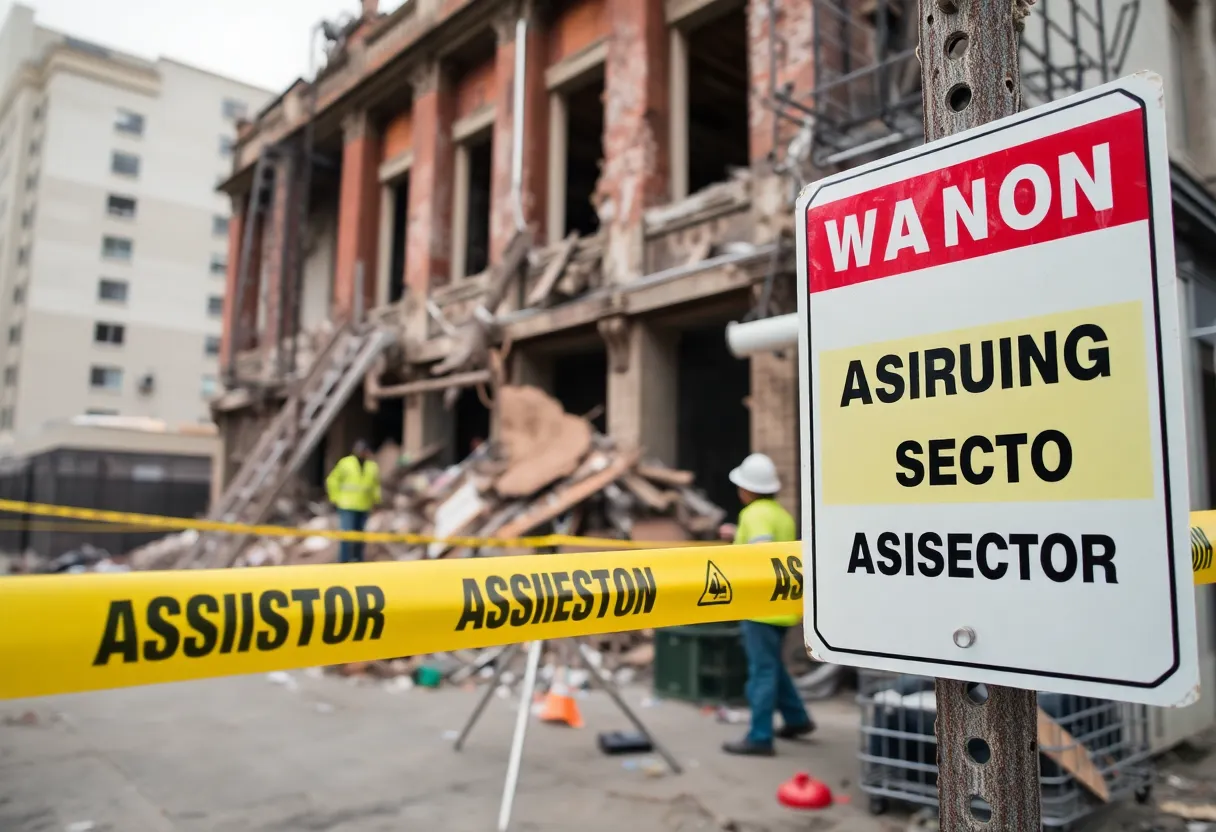News Summary
Rosenwald Collegiate Academy displays asbestos warnings as demolition begins on nearby Lindy Boggs Medical Center, highlighting health risks associated with asbestos exposure.
Asbestos Warning Signs Emerge as Demolition Projects Unfold in New Orleans
In the heart of Algiers, Rosenwald Collegiate Academy stands as a stark reminder of the dangers that lurk within its walls. Recently posted signs at the academy warn passersby of detectable asbestos, drawing attention to the toxic history embedded in many older structures. Just a stone’s throw away, behind the Lindy Boggs Medical Center—previously known as Mercy Hospital—a dumpster labeled with asbestos warnings signals a cautionary tale for construction crews.
A Long Wait for Revival
After years of delays and contentious lawsuits, crews have commenced gutting the Lindy Boggs Medical Center. However, this demolition isn’t without its risks. Asbestos, a material widely used in the U.S. following World War II, poses serious health concerns. At its peak usage, more than 1,400 million pounds of asbestos were utilized for various civilian and military applications, including structures and vehicles like Liberty ships and Army tanks.
The Toxic Legacy of Asbestos
Asbestos exposure can lead to severe health issues, particularly chronic conditions such as mesothelioma, lung cancer, and asbestosis. Disturbingly, these conditions may not manifest until decades after exposure, complicating diagnosis and treatment. It took nearly half a century for public health officials to recognize the debilitating effects associated with asbestos, and unfortunately, many workers who handled this harmful substance from the mid-1950s to the 1970s worked without any protective measures.
A Persistent Threat
Today, the consequences of past asbestos exposure remain evident. Annually, fewer than 3,000 new mesothelioma cases are diagnosed in the United States, highlighting the urgent need for improved research efforts and care pathways for affected individuals. The CDC has proposed establishing a National Mesothelioma Registry to aid research and enhance patient care, but its implementation hangs in uncertainty.
A Disproportionate Impact on Veterans
Veterans are particularly vulnerable. The risk of developing asbestos-related diseases is heightened during and after military service, especially for those who served in environments where asbestos was prevalent. Residents of coastal states, particularly those associated with the Navy, are facing six times higher risks of mesothelioma due to extensive asbestos use in naval operations.
Louisiana: A Gravesite for Asbestos Woes
Louisiana bears a heavy burden of asbestos-related diseases and deaths. From 1999 to 2017, the state recorded over 5,092 asbestos-related deaths, which include 927 fatalities from mesothelioma and 491 attributed to asbestosis. The East Baton Rouge Parish, in particular, reported an estimated 395 asbestos-related deaths during the same period. With over 211,000 veterans residing in Louisiana—many of whom served during the peak years of asbestos use—the urgency for an organized approach to diagnosing and treating these conditions has never been greater.
The Case for a National Registry
The absence of a coordinated tracking system continues to impede timely diagnoses and care for veterans and other affected populations. A national mesothelioma registry is crucial for improving detection rates and guiding therapeutic research, especially in areas where asbestos exposure is high, like Louisiana. The Environmental Protection Agency underscores that while certain countries have banned chrysotile asbestos, it remains imported and used within specific applications across the United States, continuously posing health risks.
Proposed Legal Reforms and Regulations
The recent proposal for a settlement against Demolition Doctor by the Louisiana Department of Environmental Quality serves as a reminder of regulatory lapses. The company failed to assess for asbestos prior to demolishing Cypress Tree Inn, which posed a direct threat to community safety. Testing revealed the presence of chrysotile asbestos, underscoring the need for stringent regulations requiring contractors to conduct thorough asbestos evaluations pre-demolition. When such protocols are neglected, legal ramifications, including fines and mandated disposal in compliant landfills, follow.
Moving Forward
As New Orleans approaches the demolition of buildings laden with hazardous materials, the awareness of asbestos exposure becomes increasingly critical. Misdiagnosed for years due to ambiguous initial symptoms and long latency periods, mesothelioma cases face an uphill battle for accurate detection. Moving toward the establishment of a national registry could enhance the state of care, research, and monitoring efforts nationally, especially in high-risk areas. The struggle against the asbestos legacy continues, and the fight for better outcomes remains paramount.
Deeper Dive: News & Info About This Topic
HERE Resources
Asbestos Threat Neutralized at Trumbull Center
Trumbull Center Asbestos Scare Declared Non-Hazardous
Health Risks Loom in St. Louis Following Tornado Damages
Mesothelioma Diagnosis Sparks Alarm Over Asbestos Exposure at Former Data Center
New Laws May Threaten Mesothelioma Payouts: A Closer Look
Legal Battle Unfolds: Mesothelioma Victim Takes on Shipyard Giant
Tragic Deaths Linked to Asbestos Exposure in Shropshire
Mesothelioma: Key Insights into Diagnosis, Treatment, and Prognosis
Clydebank Families Launch Online Memorial for Asbestos Victims
Retired Carpenter’s Asbestos-Related Death Prompts Investigation
Additional Resources
- Law360: Louisiana Jury Returns $3M Verdict for Family of Mesothelioma Sufferer
- Wikipedia: Asbestos
- Pelican Post: National Registry for Louisiana Veterans Needed
- Google Search: Mesothelioma
- The Advocate: Louisiana Asbestos Environmental Regulation
- Google Scholar: Asbestos Health Effects
- WAFB: Baby Powder Recall Expands Due to Asbestos Concerns
- Encyclopedia Britannica: Asbestos



















